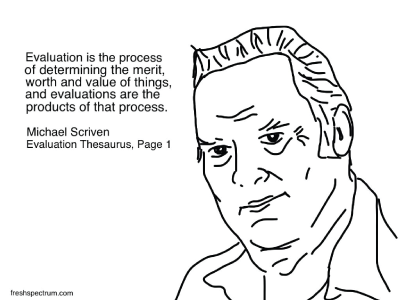
What is evaluation?
 You may already have some basic idea of what evaluation is or what it can do for you.
You may already have some basic idea of what evaluation is or what it can do for you.
What comes to mind when you hear the term “evaluation?” Do you think about pre- and post-tests that you hand out during education-based programming? Do you think about annual staff evaluations or about surveys you fill out at the end of a conference to rate your experience of the event?
The term “evaluation” covers all of these and a variety of other activities and processes. This drawing by cartoonist and evaluator Chris Lysy of Freshspectrum, LLC., offers a definition of evaluation from one prominent evaluator, Michael Scriven. This definition points out that evaluation is about more than just determining whether a program or initiative was implemented the way it was intended to be implemented, or if that implementation yielded the intended results. Instead, evaluation is a process of “determining the merit, worth and value” of the elements of a program and its implementation.
Program evaluation, the specific type of evaluation that is most relevant to sexual violence prevention workers, seeks to determine how meaningful the programs and their outcomes are to the people who are impacted by them. That is, just knowing that we implemented a program the way we intended to and that we achieved the outcomes we intended to achieve does not necessarily mean the outcomes were meaningful to the participants, that the program was as worthwhile as it could be, or even that it reached the right people. Evaluation can help us to understand these things.
What can evaluation do for prevention workers?
Evaluation is multi-faceted. Because of this, evaluation offers myriad benefits to us as prevention workers. Specifically, evaluation can benefit us in the following ways:
- We can use evaluations to measure the changes we help create in our communities through our prevention initiatives.
- Ongoing evaluations show us where we are doing well and where we can improve.
- Through evaluation, we develop language to help us tell the story of our initiatives to funders and community partners in a way that goes beyond our impressions of the program’s impact and import.
- Evaluation is one method of practicing accountability to participants, community members, and funders.
- Evaluation can keep us on track and offer ways to make strategic decisions when we need to shift our plans.
- Evaluation helps us determine if the work we are doing is the most meaningful work and/or the right work for the right people at the right time.
- Evaluation gives us a chance to participate in developing an evidence base for our work. While the field collectively develops an evidence-base for primary prevention of sexual violence, the best way to contribute to this effort is to design and evaluate theoretically sound programming. Having program planning and evaluation skills will assist you in participating in that process of building an evidence-base that is informed by the practice on the ground.
Not all of these benefits come from the same type of or approach to program evaluation, so read on to find out more about how to achieve these benefits from the process and products of evaluation.
 Inspiration
Inspiration
Watch these videos from the NSVRC Mapping Evaluation Project to hear preventionists talk about evaluating prevention work. Notice how their approaches, enthusiasms, and focuses differ and how they are similar. Do you prefer audio podcasts? Check out this Resource on the go episode: Why are We Talking About Evaluation?
